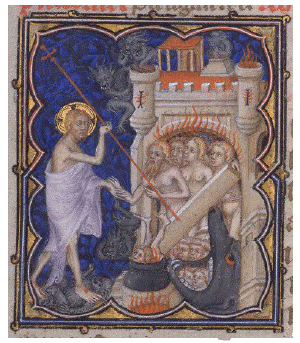 "He Descended Into Hell"
"He Descended Into Hell" "He Descended Into Hell"
"He Descended Into Hell"The final clause in this sequence, "He descended into hell," is the most controversial in the Apostle's Creed. Indeed, some denominations consider it optional or refuse to include it at all. The problem with this phrase begins with what it connotes. To some, the descent into hell represents the physical agony of death upon the Cross. It was hellish in its pain. To others, the word hell means Hades or Sheol, the collective abode of the dead, divided into Paradise or Abraham's Bosom--the state of God-fearing souls--and Gehenna, the state of ungodly souls. Thus the descent into hell may suggest that the Son of God carried the sins of the world to hell; or the Son of God carried Good News of deliverance to the godly dead such as Lazarus the beggar and the repentant thief. A third-century Syrian Creed speaks of Jesus, "who was crucified under Pontius Pilate and departed in peace, in order to preach to Abraham, Isaac, and Jacob and all the saints concerning the end of the world and the resurrection of the dead."
Still others believe that the descent into hell account for the problem of God's justice by providing an opportunity for all mankind--in eternity as well as in time--to hear the message of redemption from the Word Himself. But whatever interpretation one accepts, the scriptural passages upon which this teaching is based must be studied closely. Some of the standard texts are Job 38:17, Psalm 68:18-22; Matthew 12:38-41; Acts 2:22-32; Romans 10:7; Ephesians 4:7-10, 1 Peter 3:18-20, and 1 Peter 4:6.
From D. Bruce Lockerbie's
The Apostle's Creed: Do You
Really Believe It Victor Books, Wheaton, IL 1977, page 53-54.
Cf.
John Calvin